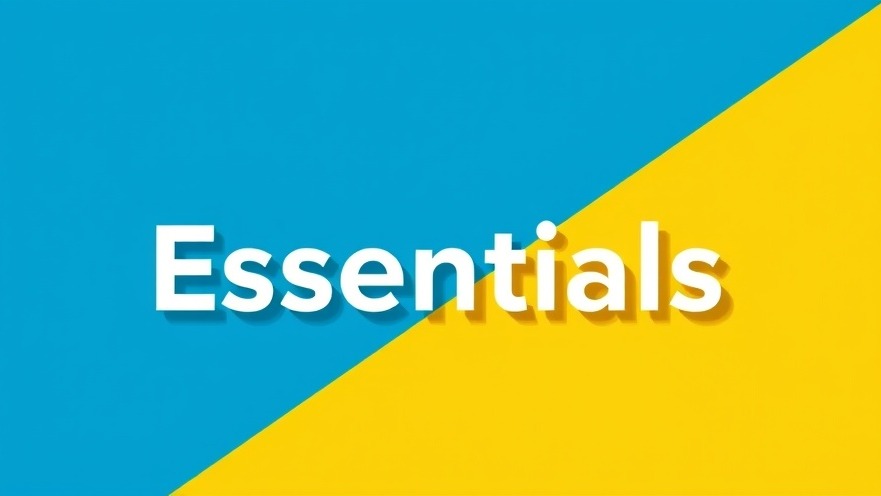
Discovering the Essentials: What You Carry Matters
Every executive and entrepreneur understands the strain of daily productivity. But have you ever considered how your choice of everyday carry items can significantly influence your efficiency? In the latest installment of Chris Bailey's podcast, "Everyday Carry," the emphasis is on the essential items that can help you manage your tasks effectively while on the go.
Chris Bailey and Ardyn unveil the contents of their bags, revealing not just items but tools that enhance productivity and alleviate stress. Chris’s backpack is a treasure trove—a practical blend of efficiency and comfort that includes a sleek Lululemon backpack, a Takeya water bottle to keep him hydrated, and noise-canceling Sonos Ace headphones to block distractions. What does each of these items contribute to his day?
The Tools of Productivity: What’s in Your Bag?
Bailey’s insights into his productivity tools reflect a broader trend observed in the lives of high-achieving professionals. The careful selection of a MacBook Pro for work aligns with the modern need for powerful, portable computing. Similarly, Ardyn's choice of a Matt and Nat backpack exemplifies the intersection of function and sustainability, echoing an increasing consumer preference for environmentally friendly products.
Both hosts underscore the importance of carrying items that do not merely serve immediate needs but enhance overall productivity. The books they carry, such as "Our Green Garden" by Diana Beresford-Kroeger, highlight how personal development extends beyond typical work items into realms of self-care and mindfulness.
Pack Light, Pack Right: Less is More
Another vital theme from this episode is the idea that less can indeed be more. In today’s fast-paced world, reliance on minimalism is growing as a practical lifestyle approach. Ardyn carries a simple yet functional laptop case and a screen cleaner, demonstrating how essential items can boost efficiency without unnecessary clutter. This minimalist approach not only helps in reducing stress but also enables smoother transitions between tasks.
The selection of versatile tools empowers users to adapt to shifting work demands. For example, the choice of a compact umbrella can save the day when unexpected weather interferes with meetings, reinforcing the essence of being prepared for anything.
Future Trends: Technology Meets Utility
As we look ahead, the trend of incorporating technology into our everyday carry items is undeniable. With innovations in wearable tech, like smartwatches and health monitors, the future of productivity tools lies in seamless integration with personal devices. These technologies aim to provide real-time data on stress levels or productivity patterns, allowing users to make informed adjustments to their day.
This fusion of technology and practicality points toward a future where our everyday carry items are not just physical objects but integrated systems designed to keep us focused and balanced. Entrepreneurs who embrace such advancements will undoubtedly find themselves ahead in the competitive landscape.
Digging Deeper: Emotional Connection to Everyday Carry
For many professionals, the items they choose to carry express more than functionality; they reflect personal values and emotional connections. The right pen, a comforting water bottle, or noise-canceling headphones can evoke a sense of calm amid chaos. Understanding these emotional ties encourages a more mindful approach toward productivity and well-being in our daily activities.
As you evaluate what you carry every day, consider not just how these items serve you but how they resonate with your values. Curate a collection that aligns with your productivity goals and reflects your personal journey.
Practical Insights: Reinventing Your Everyday Carry
Redefining your everyday carry starts with a simple assessment of your needs. What are the most crucial tools for your daily tasks? Evaluate what you currently use and challenge yourself to remove redundant items. Consider a professional’s journey—executives and entrepreneurs need to be agile. Fewer items may indeed grant clearer focus and greater productivity.
To begin this journey, make a list of your daily tasks and the problems you often encounter. Are your carry items helping or hindering? Once you identify obstacles, streamline your bag by choosing multifunctional products that meet more than one need. Initiate changes gradually—this alteration can have profound impacts on your productivity and stress levels.
Conclusion: Transform Your Productivity Today
As you re-evaluate what you carry daily, remember that every item can impact your productivity significantly. The insights drawn from Chris and Ardyn’s podcast carry weight: the right tools can ease stress and enhance your ability to get things done effectively. Therefore, take a moment to reflect on your everyday carry; ask yourself how you can transform it into a more supportive environment for your productivity.
This episode encourages action—don’t just carry random things. Every item in your bag should have a purpose that resonates with your productivity goals and personal values. Explore the potential for transformation today, and build a carry strategy that empowers rather than burdens.
 Add Row
Add Row  Add
Add 




Write A Comment